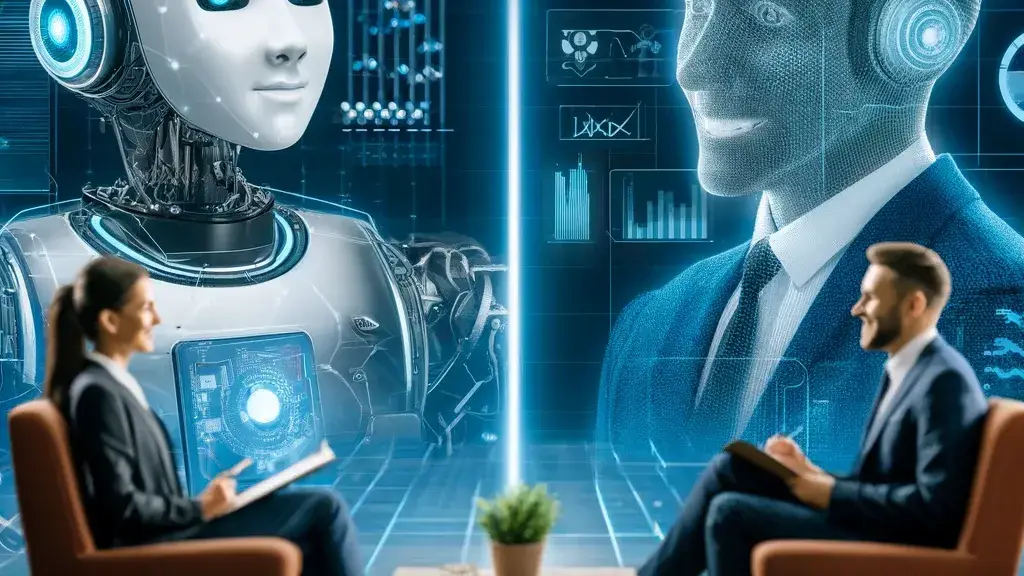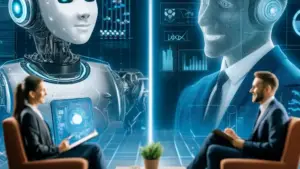In an industry where human connection matters most, why are we letting AI make our most critical hiring decisions?
As someone who’s partnered with Australian & New Zealand healthcare organisations for years now, I’ve seen firsthand how the right hire can transform entire departments.
And how the wrong one can impact patient care in ways no algorithm can predict.
Yes, AI can scan thousands of resumes whilst you are having your morning tea- but can it protect you from an expensive hiring mistake?
Can it spot the difference between a good interviewer and a good performer?
AI recruitment tools are impressive:
• They’ll scan through hundreds of resumes
• Match clinical skills and specialities
• Track compliance requirements
• Schedule preliminary interviews & screen candidates (to some degree)
But here’s what they miss – the human elements that make healthcare unique:
• The way a candidate’s eyes light up when discussing patient care
• Understanding your department’s specific challenges and culture
• Knowing why a brilliant clinician might be ready for change
• Sensing when a candidate will genuinely connect with your team
• Verify if a candidate’s experience is genuine, not just well-written
• Access hidden talent pools your competitors don’t know about
• Provide real-time market insights about salary expectations
• Protect your employer brand during negotiations
• Secure top performers who aren’t actively job hunting
• Navigate complex salary negotiations to land your ideal candidate
• Fast-track critical hires when time is money
Here’s a common scenario I hear from healthcare leaders: “We’re not getting quality applicants anymore.” When I dig deeper, I discover their applications are flowing through an Applicant Tracking System (ATS) – and there’s the problem.
The harsh reality? Your ideal candidates are likely applying, but they’re getting lost in your ATS. Why? Because most healthcare professionals craft their CVs for human eyes, not algorithms. Their valuable experience gets filtered out before a real person ever sees it.
Think about it: that exceptional Manager with 15 years of experience, a real “game changer”, might be in your system right now, but if their CV doesn’t match your ATS keywords exactly, they’re invisible to your hiring team.
This is why our clients see dramatically different results – we combine smart technology with human expertise to ensure great candidates don’t slip through the cracks.
Every day, I see the difference this human touch makes:
- When I check in with my client post placement and learn their new Theatre Manager has created such a positive culture shift that staff are turning down higher-paying roles elsewhere to stay with the team. Whilst building a relationship with this Theatre Manager, I noticed subtle indicators that signalled exceptional leadership potential, something no algorithm could have predicted from a CV.
- During our interview, a Facility Manager shared a story about preserving a resistant resident’s dignity. Their entire demeanour changed – leaning forward, voice softening, eyes lighting up as they spoke about resident independence. No algorithm could have detected these subtle cues that revealed a leader who would inspire their team to create innovative, resident-centred care solutions within their first 6 months in their new role. These human nuances told me, and my client more about their potential to transform care culture than any CV keyword ever could.
- When interviewing a Scrub Scout, they described a moment where they swapped out an instrument before the surgeon even asked – not because of a verbal cue, but because they noticed a subtle change in the surgeon’s posture and the rhythm of the procedure. While AI would have missed this critical insight, I recognised a professional who truly understood the unspoken language of theatre. They weren’t just listing competencies; they were sharing instincts honed from thousands of hours of focused observation (in 3 different counties as well!).
- Similarly, an Anaesthetic Nurse shared how they make a difference by adjusting their approach when comforting a patient from a different cultural background – adapting their communication style, body language, and presence to match the patient’s cultural preferences and comfort level. AI might have noted “cultural competency” (had it been on their CV) but would have missed the natural empathy and cultural intelligence revealed in how they told their story.
Both candidates might have appeared average on paper. Their CVs didn’t scream “exceptional.” But in conversation, their deep understanding of human nuance and situational awareness showed me they would excel in our client’s high-performing theatre environment, where these subtle skills make all the difference to patient care and team dynamics. Would those CVs have got through to the hiring manager – my guess is no!
What AI can miss:
These are just two scenarios I recently uncovered simply by asking, ‘Why has this role become vacant?
- Theatre Manager role: The previous candidate looked perfect on paper: 14 years of experience and all the technical skills matched perfectly. AI screening tools gave them a green light, and automated reference checks came back clean. The reality? Their leadership style created such severe team friction that three nurses resigned within six months. The cost: over $150,000 in temp agency fees, not to mention the devastating impact on patient care, team morale, and theatre efficiency.
- HDU Nurse role: The previous candidate’s CV showed four different hospital roles in three years. AI flagged them as a perfect technical match, and automated reference checks from HR departments were satisfactory. Three months into the role, history repeated itself – they left after conflicts with their Manager.
A single human conversation with their previous managers could have revealed this pattern, saving significant recruitment and training costs.
Why Human Expertise Matters:
These aren’t just stories – they’re expensive lessons about the limitations of AI in healthcare recruitment. While AI tools flood the market with promising ROI, they can’t replace the nuanced understanding that comes from years of healthcare recruitment experience.
We know:
- Which questions reveal potential red flags
- How to read between the lines in reference conversations
- When to dig deeper into seemingly minor issues
- How to spot patterns that algorithms miss
These human elements make the difference between a good match on paper and an exceptional hire in reality.
The Future of Healthcare Hiring Goes Beyond Data
Your next hire will shape patient experiences, drive clinical outcomes, and influence your facility’s future. While AI excels at processing thousands of CVs, it can’t detect the subtle signals that separate exceptional healthcare leaders from those who simply interview well.
Beyond matching skills and experience lies a critical truth: the most expensive hiring mistakes often look perfect on paper. It’s in the spaces between the data points – the unspoken team dynamics, leadership nuances, and cultural alignment – where your investment is truly protected or put at risk.
Technology is revolutionising some aspects of healthcare recruitment processes, but it’s human insight that transforms good candidates into exceptional hires.
The question isn’t whether to use AI or human expertise – it’s about knowing when each matters most.
Can you afford to trust your healthcare team’s future to algorithms alone?
#HealthcareLeadership #HospitalManagement #ClinicalLeadership #ClinicalDirectors
#DirectorofCare
Kate Wheeler
Career Transformation Specialist | Founder: Carejobz & The Human Edge | Top 10% ANZ Recruiter | 20+ Years




